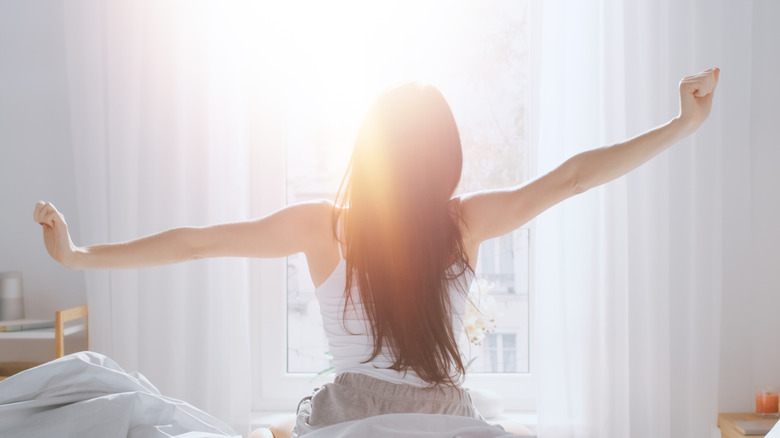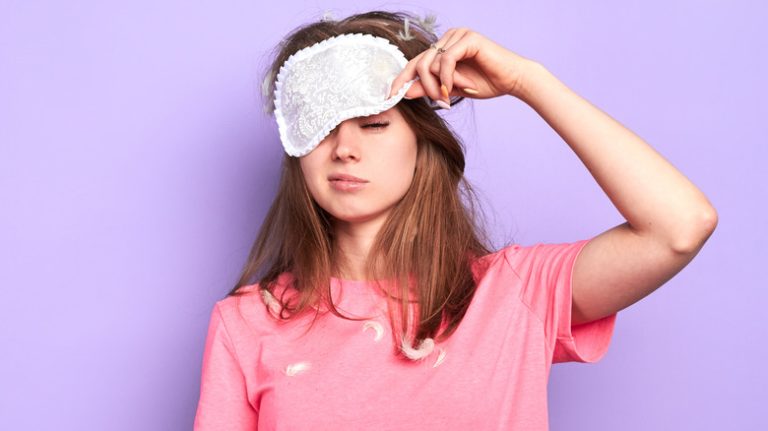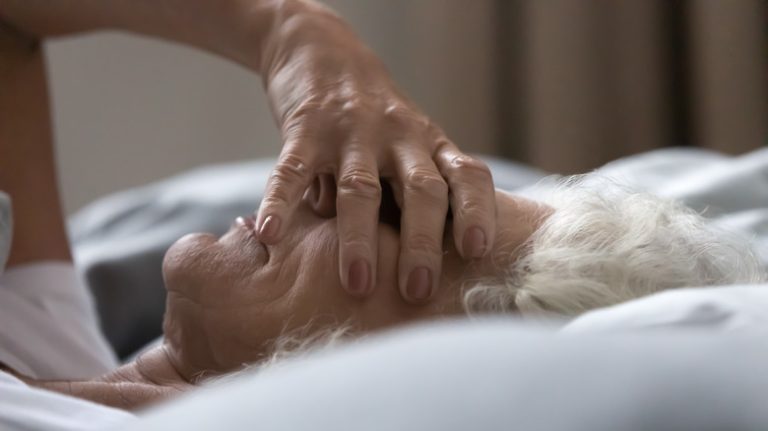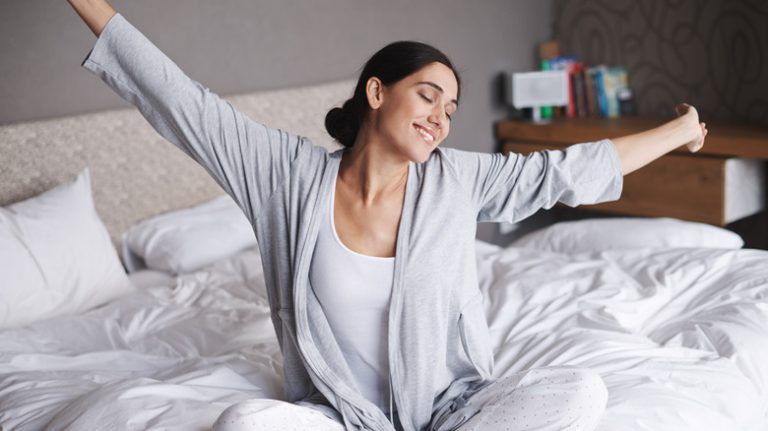You might think the world is divided into two definitive categories: those who consider themselves to be morning people, and those who don’t. However, if you find yourself in the former category and have a hard time jump-starting your day, there is hope for you yet. Turns out there are actually things you can do to swap teams and become one of those people who is naturally energetic — or even, dare we say, cheerful — in the morning.
Before diving into these tactics, it’s important to acknowledge that there are certain biological factors that tend to determine whether you’re the type to stay up late and sleep in, or go to bed early and wake up early. According to experts at the Cleveland Clinic, this is called your “chronotype,” and it can vary from person to person. While there is nothing necessarily wrong with being a night owl, the problems start when your tendency to sleep in late begins to interfere with your daily responsibilities. The good news here is that developing certain daily habits can actually shift these tendencies over time and make it much easier to rise and shine. Continue reading to discover what habits to develop if you want to become the morning person of your dreams.
Stop hitting snooze
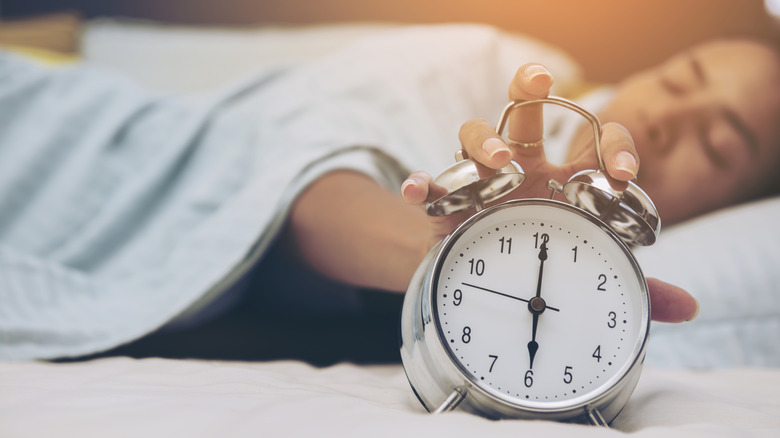
We know, we know — it seems like an impossible feat, but if you want to start the day off less groggy and more alert, you should stop hitting the snooze button. While it may seem like a natural or logical part of your morning routine, pressing snooze is not as innocent or harmless as you may think. In fact, the Cleveland Clinic goes as far as to say that consistently pressing snooze in the morning may be an indicator of an underlying sleep disorder.
Firstly, while you might think it’s giving you a few extra moments of quality sleep, the opposite is true. Those five or ten extra minutes of sleep you get dozing off do not qualify as restorative sleep — the kind of sleep that makes you feel more alert. What pressing snooze actually does is disrupt your R.E.M. sleep cycle, which experts at the site say can actually startle you into a “fight or flight” response and increase your heart rate and blood pressure. To help combat this habit, make sure you’re getting seven to eight hours of sleep a night. If you still feel the need to press snooze after that, you should probably visit your doctor to make sure nothing else is going on in the background.
Grab a glass of water

You may already have heard about the health benefits of grabbing a glass of water first thing in the morning, but did you know that drinking a fresh glass when you wake up can also assist you in your efforts to become an early bird? Business Insider spoke to health experts and discovered why some top executives are in the habit of chugging water in the morning. Rania Batayneh, a nutritionist and the author of “The One One One Diet,” explained to the site that “One of the biggest indicators of lethargy or low energy is that you are dehydrated. Because water aids in both body regulation and brain function, it is also closely related to balancing out our moods.” Going eight hours without hydration is a long time, she explains to the site, so drinking a cold glass of water in the morning can act as a “shock” to your system, get things moving, and can “boost your alertness and low energy levels.”
Healthline further confirms the benefits of this practice, explaining that making sure you’re hydrated can significantly improve brain function. Indeed, one study showed that fluid loss of as little as 1.6% can cause memory loss, fatigue, and feelings of anxiety (via British Journal of Nutrition). So if you’re waking up in a tired funk, you may want to reach for some water to get your body going.
Take a cold shower
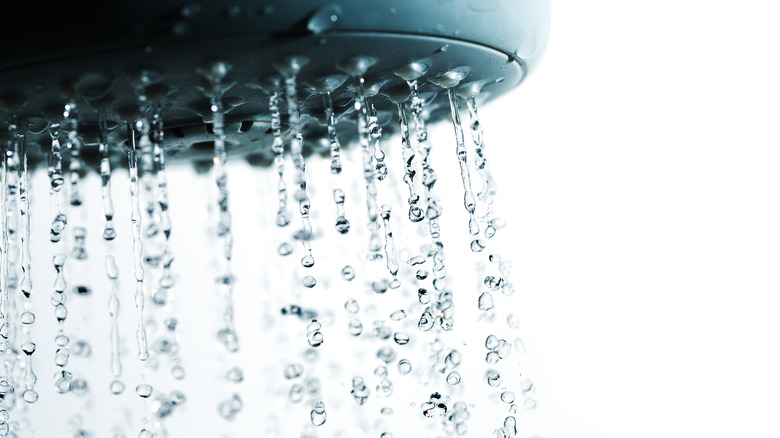
Janis Smits/Shutterstock
Continuing with the theme of water, shocking the outside of your body with cold water in the morning has also proven to be an effective way to get you moving. Healthline explains that turning the dial from hot to cold in your a.m. shower has the positive effect of increasing your oxygen intake, your heart rate, and your alertness. Furthermore, that blast of cold water can increase your circulation. Experts explain that as the cold water hits the surface of your skin, it restricts the circulation there, forcing the blood that is deeper within your tissues to circulate faster in order to maintain optimal body temperature.
Aaron Drogoszewski, co-owner of ReCOVER studio in New York City and a NASM-certified personal trainer, spoke to Runner’s World about more benefits of taking cold showers, noting that “Hormones and neurotransmitters kick into high gear during these exposures, leading to an increase in physiological and mental resilience.” As for how cold it should be, Drogoszewski states that anywhere from 60 degrees on down is a good bet. However, he suggests starting slow with this practice to make it more sustainable. “The goal is to engage in the practice long-term, so if it’s absolutely miserable, the likelihood of sticking with it is pretty slim.”
Move your body

Undrey/Shutterstock
Getting up to exercise in the morning might seem like a challenge when you’re barely able to reach over and turn off the alarm, but no one said becoming a morning person would be without its sacrifices. Getting in a morning workout has an abundance of benefits, according to Healthline, starting with increased alertness. If you need a reason to get up to work out, Healthline explains that because our cortisol levels are naturally higher in the morning, working out may actually be easier at the start of the day. Cortisol is the hormone that is responsible for making sure you are “awake and alert,” according to the site, and is typically higher in the morning, and lower at night.
Furthermore, the site explains that working out regularly is known to boost your energy and help fight fatigue. Working out helps increase the circulation of blood and nutrients to your heart and lungs, effectively energizing you. Furthermore, if you have sleep problems, working out in the morning could help you sleep deeper at night, which can actually help you wake up earlier in the a.m. Studies have shown that those who wake up earlier to work out get deeper sleep compared to those who don’t, according to the site.
Grab a cup of coffee

Art_Photo/Shutterstock
Finally, something on the list you can get behind. And yes, this one is as simple as it sounds. No cold water, no pushups — just a steaming hot cup of joe ready to help you jump-start your day. Coffee is certainly not the new kid on the block when it comes to getting people to wake up, and Healthline explains why this morning beverage is one of the most popular there is. Perhaps the most obvious reason coffee gives you a jolt in the morning is due to its caffeine content. Caffeine acts as a stimulant to the central nervous system, and is specifically known to help perk you up. The reason for this is that caffeine blocks a neurotransmitter called adenosine, which in turn elevates other levels of neurotransmitters in the brain that contribute to increased energy.
For instance, one study showed that golfers who consumed caffeine both before and during a game of golf experienced “improved performance, increased subjective energy levels, and reduced feelings of fatigue.” Aside from the boost it gives to your energy levels, Healthline explains that coffee has also been linked to improved heart health, longevity, improved brain health, and weight management.
Fuel yourself with breakfast

Drazen Zigic/Shutterstock
For many, breakfast is a favorite meal of the day. There are plenty of options, both savory and sweet, and preparing it can feel like somewhat of a ritual. If you feel sluggish in the mornings, preparing a breakfast that is nutritious and filling can even help you offset fatigue and stay energized throughout the day.
Experts at Healthline explain that there is something of a holy trinity when it comes to elements in your breakfast — what you want is a healthy balance of protein, carbohydrates, and fat. Starting with proteins, the site explains that these are used to help “build and repair tissue in your body,” and can leave you with much needed energy to start the day. Next, carbohydrates are considered to be our body’s primary energy source. Lastly, fats are an important addition to your breakfast because they provide you with energy and help you to better absorb nutrients. Examples of breakfasts that incorporate all three of these elements include a bowl of oatmeal with protein powder, fruits, and nuts; almond butter blended into a smoothie or in a bowl of oatmeal; and eggs mixed into an omelet with vegetables, just to name a few.
Let there be light
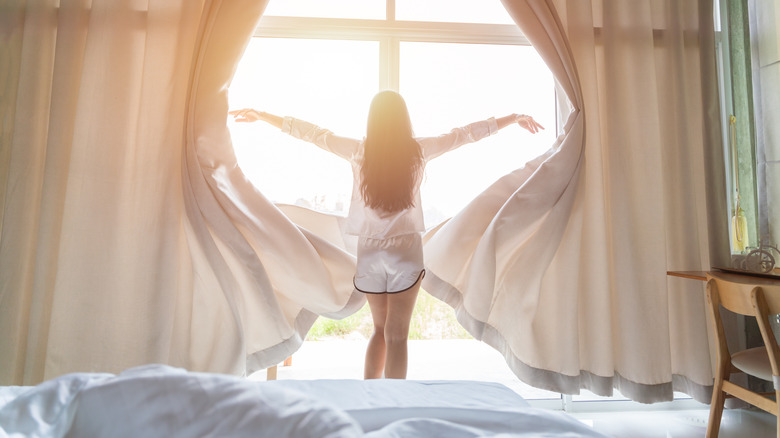
Tong_stocker/Shutterstock
There may actually be some science behind that somewhat cliched image of someone rising out of bed to open their curtains and gleefully receive the sun. This technique is interesting in that it benefits your morning energy levels by helping to regulate your circadian rhythm, thus enabling you to get more sleep at night and wake up more refreshed in the morning (via Verywell Health). This is because exposing yourself to light in the morning can help boost your levels of cortisol, which is a hormone that helps your body to create energy from the food you eat, and helps to control your sleep-wake cycle (via Cleveland Clinic).
If you are in the camp of people who fall asleep late and tend to sleep in, experts explain that you might have “delayed sleep phase syndrome,” which could be regulated by exposure to light at the right time (via Verywell Health). Exposing yourself to natural sunlight first thing in the morning is the best, however a study published in Scientific Reports also found that blue-enriched LED light has been shown to combat morning drowsiness and “significantly improved subjective perception of alertness, mood, and visual comfort” in a group of 15 students.
Turn up the tunes
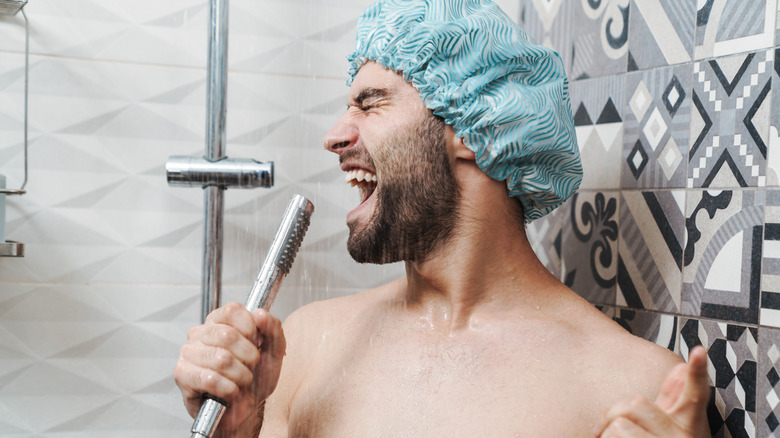
Dean Drobot/Shutterstock
Another morning get-up routine that won’t take much convincing to get behind: blasting your favorite songs. MindBodyGreen reported that music psychologist and Cambridge Ph.D. candidate David M. Greenberg participated in a study with Spotify and found that the ideal “wakeup” song has to have certain elements in order to work best. Those elements include the capacity to build over time, positive lyrics, and a strong beat. Regarding the first criteria, the research showed that the song must gradually get you out of bed and moving, and increase your energy levels bit by bit. So sorry Metallica lovers, heavy metal probably won’t make the cut. Secondly, the researchers found that the lyrics have to be positive. If you’re used to listening to heartbreak anthems, a la Adele, you might have to press skip on those. Lastly, the song has to have a strong beat, so no slow jams allowed. Experts at the site explain that the song should make you want to dance, with beats per minute being between 100 and 130.
Utilize aromatherapy
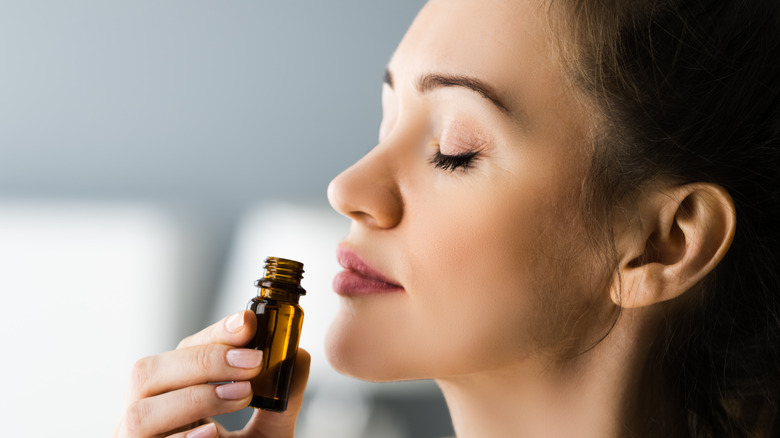
Andrey_Popov/Shutterstock
Aromatherapy is another gentle, yet effective way to help get yourself out of bed in the morning. Healthline experts define aromatherapy as a holistic treatment that uses “natural plant extracts” in the form of essential oils to help heal your mind, body, and spirit. The use of aromatherapy is nothing new. It’s been around for thousands of years and has been used for both healing and religious purposes. As for what it can do to help you wake up, the sleep scientists at Sleep.org explain that a select group of essential oils can help to both stimulate and energize you in different ways.
Topping off their list of energizing oils is peppermint. It is widely known to treat inflammation and breathing issues, and research has also shown that it can increase alertness and oxygenation of the blood. Next on the list is rosemary, another stimulating oil that is actually known to increase breathing and heart rate. The category of citrus oils — which includes lemon, lime, grapefruit, and orange — can also give you some pep in your step. Research has shown that lemon essential oil is particularly activating, and has been shown to help improve both mental and physical performance.
Stretch
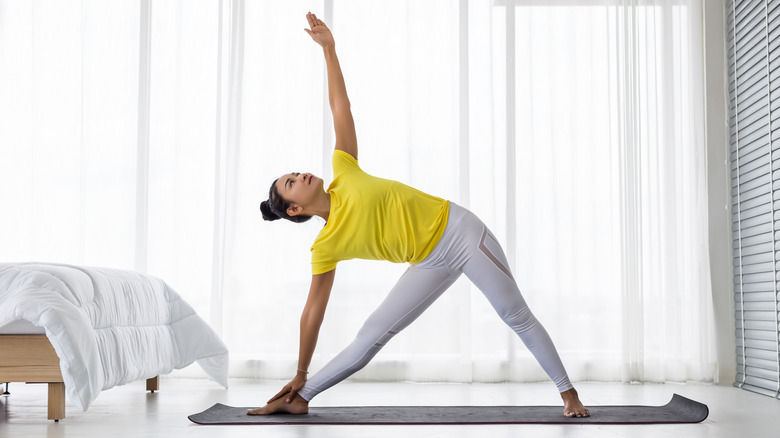
Butsaya/Shutterstock
There’s a reason why you instinctually flex your toes and reach to the sky with your arms each morning before you get out of bed. Sleeping in one position for the duration of the night can leave you with stiff muscles and an overall uncomfortable feeling. Harvard Health Publishing explains that stretching does a lot more than just elongate your muscles: It can help wake you up too. Dr. Beth Frates, director of wellness programming for the Stroke Research and Recovery Institute at Harvard-affiliated Spaulding Rehabilitation Hospital, spoke to the university’s website and said, “Stretching before getting out of bed can help wake up the body and improve the circulation. It can also turn on the parasympathetic system — the ‘rest and digest’ system — which puts us in a more relaxed state right when we get out of bed …”
Before you step into downward dog, Frates first suggests warming up your muscles a bit while you’re in bed by flexing your joints. You can flex your feet and roll your ankles to start, then roll your shoulders and flex your wrists. After you’re done flexing, you can get out of bed and start stretching. Frates recommends single knee pulls, quad stretches, hamstring stretches, and yoga poses such as child’s pose and cobra to get your muscles moving.
Develop a morning routine
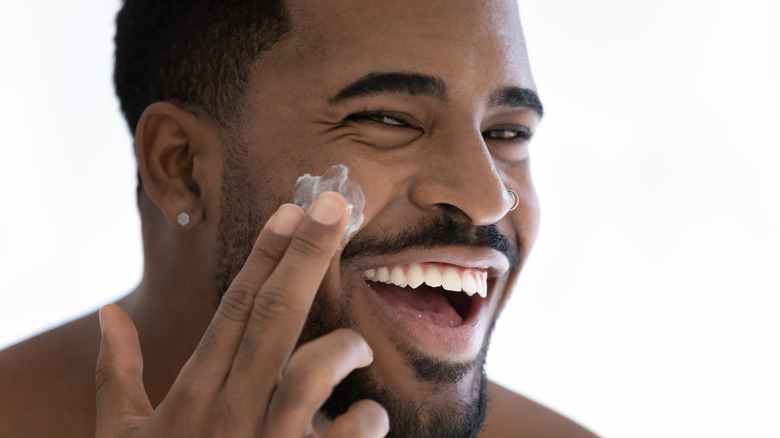
fizkes/Shutterstock
Having a routine in the morning can be extra motivation to get out of bed and start the day. Creating intentions and consistency around your mornings may give you a greater sense of purpose that makes it easier to leave the warm nest that is your bed. Erin Engle, a licensed clinical psychologist at Columbia University Irving Medical Center, spoke to Insider about why it’s so important to develop this practice. For starters, she suggests — and this one may seem obvious — to get out of bed. “Getting out of bed is the first step. Then, select one activity that you can bring full attention to, whether that be prayer, affirmation, a physical stretch, or brushing your teeth,” she says.
Developing this type of routine has benefits that extend beyond giving you a fresh start to your day. Over time, these rituals can help you better cope with “external stress” and deal with other challenges throughout the day. Engle also suggests making sure you have a set waking time, which provides consistency and helps set your internal clock, making it easier to fall asleep and to stay asleep. Additionally, be sure to plan how much time you’ll need for yourself in the morning to complete your activities. This will help you avoid feeling rushed, and make all the steps feel more pleasurable.
Head outside for a walk
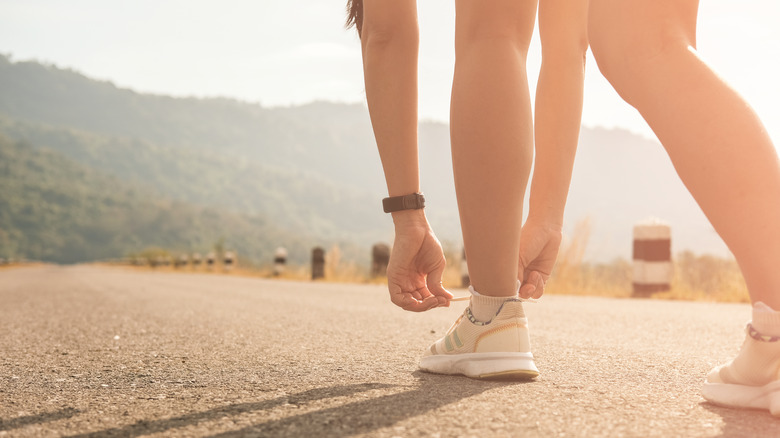
SPNG/Shutterstock
Getting a breath of fresh air in the morning via a brisk walk may be exactly what you need to wake up. While we already know that moving our bodies is a great way to boost a.m. energy levels, doing so outdoors offers even more benefits. One study published by The Journal of Environmental Psychology found that those who took walks outside experienced “greater vitality” than those who walked inside. Another study published by Physiology & Behavior found that in women who were sleep deprived, walking up the stairs actually had a more energizing effect than consuming a cup of coffee — just make sure to do it outdoors for the extra boost.
Healthline also reports that a morning walk outside may help improve your mental acuity. If you’ve got a big day ahead and are still feeling groggy and uninspired, walking has been shown to improve both cognitive functioning as well as creative thinking and problem solving. Furthermore, that morning dose of sunlight you’ll receive on your walk can help boost serotonin levels, according to another Healthline report, which can help improve your circadian rhythm and lead to more refreshed mornings.
Make your bed
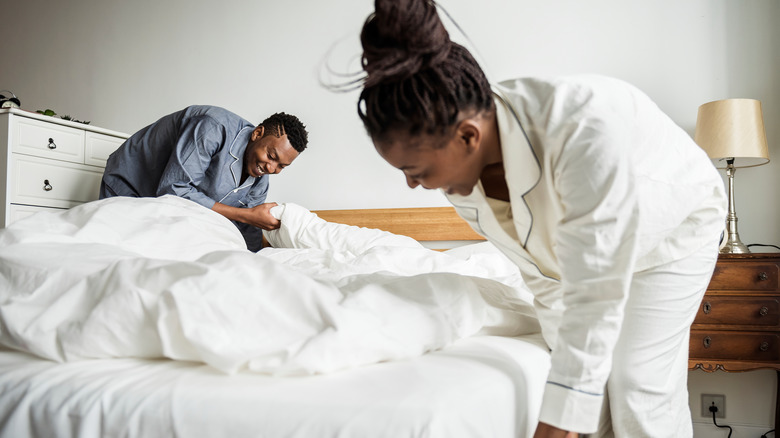
Rawpixel.com/Shutterstock
For those who aren’t accustomed to doing it, making your bed may feel like an unnecessary chore. Why put in the effort when it’s only going to be unmade again at the end of the day? Despite this fact, there are good reasons to make the bed that might have a significant effect on your day. Verywell Health explains that this seemingly small task has the potential to set your day up for a series of successes. If you start your day by making your bed, you are essentially signaling to yourself that you’ve successfully completed a task, which will encourage you to continue accomplishing other things. Much like developing a morning routine, making your bed can be a ritual that helps you develop a “responsible, balanced, or successful life,” according to the site.
Additionally, this task can help improve your focus and information processing. Making the bed can also have the positive effect of improving your sleep at night, which can help you wake up more refreshed and ready to take on the day — as Verywell Health explains, a cleanly made bed may provide a more pleasant sleep environment, making it easier for you to fall asleep.
Improve your nighttime routine
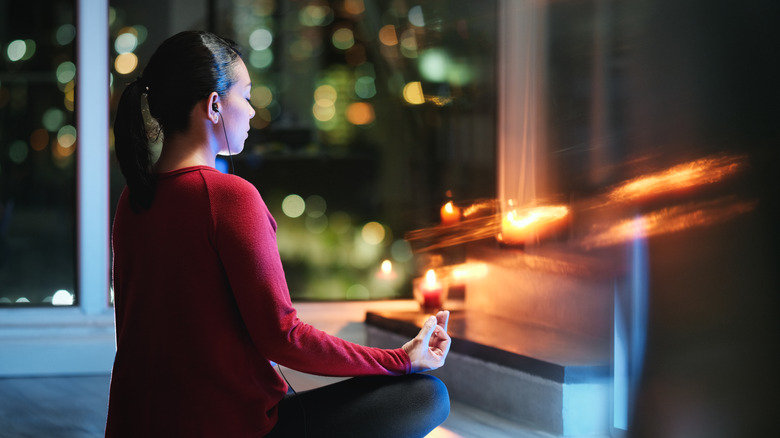
Diego Cervo/Shutterstock
While paying attention to how you wake up in the morning can affect your a.m. energy levels, focusing on what happens before bedtime can be just as important. According to the Sleep Foundation, sleep hygiene is defined as having a “bedroom environment and daily routines that promote consistent, uninterrupted sleep.” This can mean making sure your bedroom is cozy and distraction free, as well as creating a bedtime ritual that can make it easier for you to fall asleep. The side effects of not practicing good sleep hygiene can include interrupted sleep, grogginess upon waking, and tiredness throughout the day.
Claire Kenneally, a board-certified sleep specialist at the Chicago Sleep Center, spoke to Glamour about the importance of developing healthy habits before bed … and what things you should avoid. She specifically points the finger at using tech before bed, and says, “It’s very hard if you’re working on your computer to just close the computer and get into bed. The brain can’t switch gears that quickly.” Using tech may also interrupt your sleep throughout the night, leading you to wake up and continue to think. She suggests starting to wind down from tech and other distractions at least two hours before bedtime to send the proper signals to your brain.

